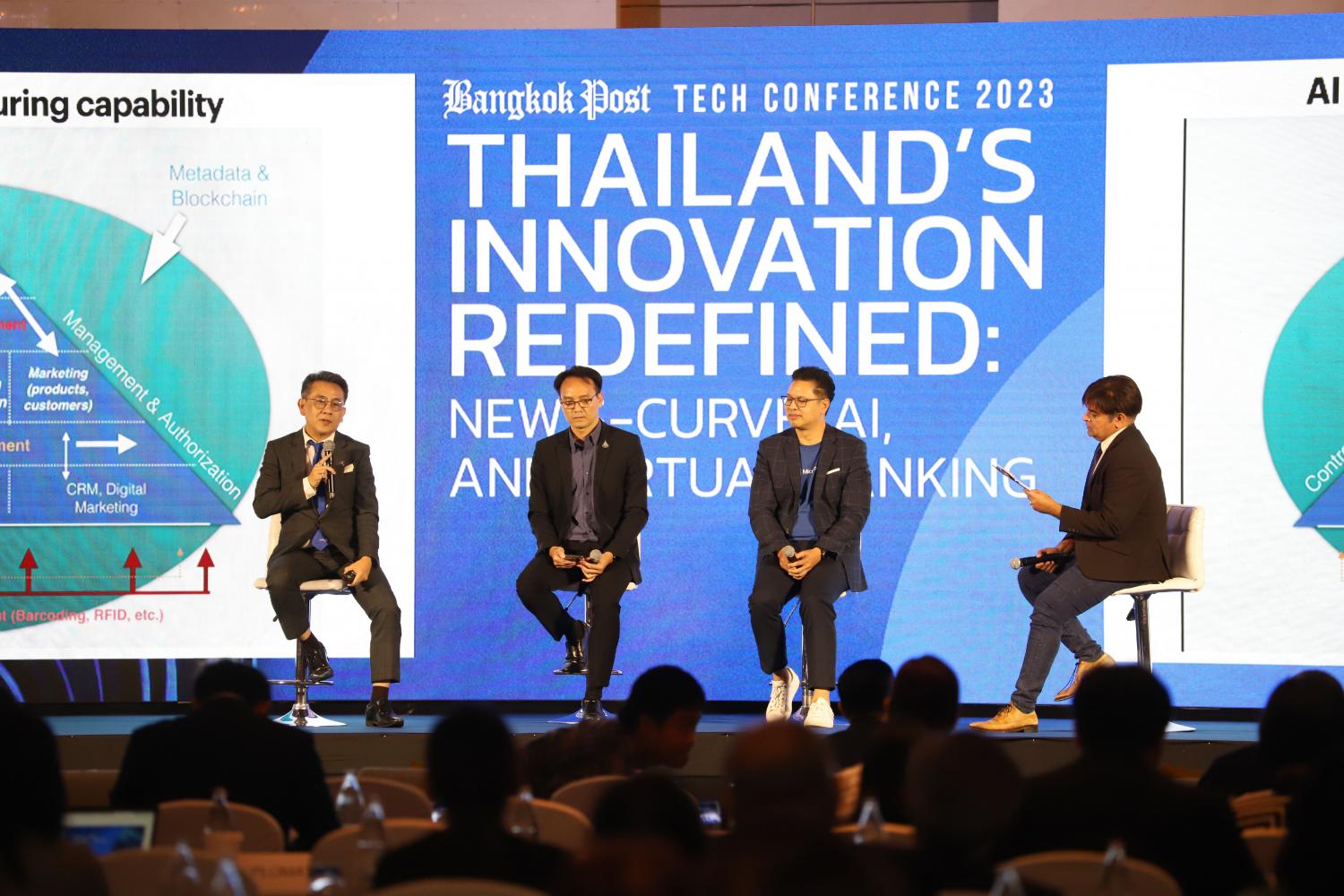
Pictured from left are Mr. Wiboon, Mr. Chai and Mr. Dhanawat, the speakers of the forum. Varuth Hirunyatheb
Artificial intelligence (AI), especially generative AI, can create new opportunities, transform industries with a new business model, and empower new ways of working with a digital co-pilot, but its use and development should be based on accountability and governance to ensure it is not misused, say IT industrialists.
Dhanawat Suthumpun, chief executive officer of Microsoft Thailand, said there are several technologies that have changed the world, from the internet and mobile technology to the cloud and now artificial intelligence.
AI represents an opportunity for everyone in the private and public sectors, Dhanawat said in a panel discussion on the theme ‘AI Revolution: Profits, Advances and Dangers’. He was part of the Bangkok Post Tech Conference 2023 titled “Thailand’s Innovation Redefined: New S-Curve, AI, and Virtual Banking” held on Wednesday.
AI is now ready as a user interface that allows humans to communicate with computers using natural language, he added.
Additionally, Dhanawat said AI could gain insights from the information. Having the great Chat GPT-4 language model is akin to having a supercomputer sitting next to you.
He likened AI to a co-pilot sitting next to a human, assisting with many tasks, from reading information to summarizing content for them, and could even help turn human imaginations into images.
Dhanawat added that while AI can offer opportunities, its use must come with responsibilities to make sure it isn’t used the wrong way. Its use requires governance, ethics, accountability, fairness and transparency.
He said artificial intelligence will not replace humans. It could eradicate some jobs but also create new ones and introduce new ways of working to improve people’s productivity. It would be people controlling the AI and making the final decisions about what it should do.
Mr Dhanawat said he expects to see a new way forward with humans co-creating content with AI rather than running AI’s “autopilot” for them.
He also suggested that the Thai government create super apps for travelers by collecting tourism data and using generative AI to suggest and recommend travel planning in line with tourists’ preferences.
Dhanawat urged the government to allocate a huge budget to build an “AI Sandbox” for startups and state agencies to learn and work together on AI development.
At an enterprise level, AI can enable organizations in every segment to improve their operations and productivity, he added.
He suggested that people should open their minds to understand AI, relearn, retrain and work with AI to create more career opportunities and positive impacts.

Wiboon said artificial intelligence (AI) technology and workers can work together to further develop production processes and make innovative products in various industries.
IT’S TIME TO SAVE
Another panelist, Chai Wutiwiwatchai, executive director of the National Electronics and Computer Technology Center (Nectec), said the time has come for all companies to upgrade and improve their AI literacy across their task force as this innovative technology could be a human co-pilot, enabling the ability to seize business opportunities and public benefits.
The AI ecosystem is developing into Artificial General Intelligence, a hypothetical type of AI that would have the ability to perform any intellectual task that a human can do.
Meanwhile, the development of AI requires laws, ethics and standards that must have transparency and accountability, including issues of security, privacy and fairness.
Chai said AI can increase competitiveness, improve products and services, and promote sustainability development for all business sectors and the public sector.
To adopt AI, he said there are three things businesses need to consider: benefits, ease of payment, and the extent and governance of AI.
Chai said the governance approach is a key factor in ensuring the trustworthiness of AI.
Last year, the Ministry of Digital Economy and Society started providing the AI Governance Clinic to help enterprises comply with guidelines and standards.
The National Commission’s office for the Digital Economy and Society is drafting AI regulations that would be a framework governing the development of AI in the country, Chai said.
Recently, the National Science and Technology Development Agency and the Electronic Transactions Development Agency jointly conducted a study on the willingness of enterprises to apply AI technology in digital service offerings.
The teams sent out questionnaires to businesses in 10 sectors, covering 3,529 companies, with 565 respondents.
The study found that 15.2% of companies have already implemented AI, 56.7% plan to adopt it in the future, and 28.2% have no plans.
HAND IN HAND
AI technology and humans can work together to further develop manufacturing processes and create innovative products in various industries, said Wiboon Rugsancharoenpol, deputy secretary general of the Federation of Thai Industries (FTI).
“It’s a challenging job for industries to adopt AI, which can improve production capabilities and bring good results to businesses,” he told a panel titled “AI Revolution: Profits, Progress and Perils.”
Wiboon is aware of many people’s concerns about the negative impact caused by artificial intelligence, which can disrupt industries and replace workers, leading to unemployment.
That’s not always true, he said, because many industries in Thailand are facing labor shortages. They need more workers to help run businesses.
AI can help businesses tackle various complex jobs, but they still need to be led by humans as people have the creative power, driven by imagination, to do their job. This shows that people are even more important than AI, Wiboon said.
However, the FTI wants to make manufacturers aware of the benefits of AI and learn about this new technology as it can help them improve factory operations and reduce costs in the long run.
One problem is that many companies fear they don’t have enough budgets to invest in AI technology, Wiboon said.
At present, only a handful of companies use this technology.
The FTI has worked closely with the private and government sectors to help entrepreneurs improve their businesses through artificial intelligence and provide all the necessary information to those who want to adopt the technology.
“FTI and Nectec have set up a joint committee to work on a program to introduce artificial intelligence into industries,” Wiboon said.
“We expect to launch the program as soon as possible.”
This program will help the manufacturing and service sectors have a greater understanding of artificial intelligence and how to apply it in business.


#Companies #invited #embrace #potential #technology
Image Source : www.bangkokpost.com
